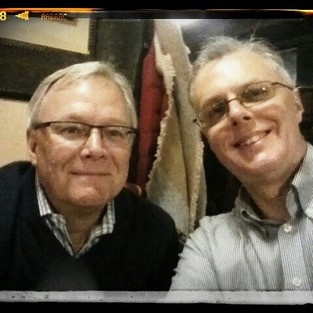This is an excerpt of the new book
“Circle of Impact: Taking Personal Initiative to Ignite Change” published in September 2018 by my dear friend Dr. Ed Brenegar.

Dr. Ed Brenegar
Why Personal Initiative Matters
To make a difference that matters does not have to be a big project or the creation of a business. All that is required is for a person to act upon the values that are important to them.
It can be a simple comment while standing on a street corner. It can be an act of kindness, an expression of gratitude, or a display of courage. It can be a word of honesty in a meeting or an act of sacrifice to help a friend in need.
It just has to be an act of personal initiative that creates a beneficial change.
Leadership begins with personal initiative because, increasingly, companies depend upon their people taking steps to do the right thing in the moment of need.
In the past, when we defined leadership as a title or a role, we were saying that organizational structure was the defining characteristic of leadership. The result was that anyone below the level of CEO could essentially say, “That’s not my job!” and pass it up to their supervisor or manager.
Small problems became large issues because initiative was squeezed out of the system. Maintaining order and integrity in the system of operation became the purpose of the company. The result was the spread of organizational silos that compartmentalized the legacy structures of the past.
The speed of change that impacts us today requires organizations to be agile and adaptive in responding to changing circumstances. It isn’t just that organizations need leaders who are equipped to take personal action within the parameters of the values and purpose of the organization. We need it through all kinds of institutional settings in society.
Everyone - regardless of who they are, where they are from, or what their educational and occupational credentials – needs to be practicing leadership initiative.
When leadership is understood as a function of human initiative, then the motivation to take initiative is a personal one. The supervision of employees cannot simply be based upon an employment contract. Rather, the leadership initiative of employees needs to be encouraged as essential to the health and vitality of the company.
To say that we want people to take personal initiative is not to say that any initiative is okay. Rather, we need people to operate within a culture of shared values that guide the company and therefore guide the decisions and actions of every individual.
Simply advocating for great employees to have greater responsibility will not work without an alignment of the three dimensions of Ideas, Relationships and Organizational Structure. I call these three aspects the Three Dimensions of Leadership.
Personal initiative becomes leadership impact when our actions influence others to act with us in a shared, coordinated fashion.
This is the key to understanding leadership in the 21st century. It is both personal and social.
Our potential is not a defined amount of good that we can produce in our jobs or lives. There is no box out of which we draw our defined amount of life potential. Rather, potential is the opportunity that comes from an environment of openness to create impact, which is released through personal initiative.
Many of us seek to live quiet, respectable lives of meaning and service to people and places we care about. Too often, we find that we are bound by the obstacles that society and organizational structure place before us that keep us from realizing our potential. Most of us never even think that we have potential.
Do you want to know your potential?
State what you care about, and how things would be different if you could give your whole self to its betterment. Remove the obstacles and watch what happens.
These obstacles to fulfilling our potential occur because we allow ourselves to be defined by social and organizational situations that have no clear purpose or outlet for creating impact.
Down deep within us are desires that constantly suggest to us that we are made for more than what we are doing. People join projects of participatory philanthropy, like breast cancer walks, or work at a soup kitchen for the poor and homeless, because they desire to live lives that matter beyond the mundane exercise of their daily duties.
They spend their days sitting in offices looking forward to taking personal initiative outside of work. As a result, the potential for people to make a difference that matters at work is not even considered.
The path from personal initiative to leadership impact is achieved by removing obstacles of the mind, body, and spirit where our desires find their expression. Obstacles of small ambition. Obstacles of poor discipline in how we live. Obstacles of relationships that we allow to hold us back from believing that if we give ourselves to some desire to make a difference, then we can achieve our goal. These are personal obstacles that we can change.
There are also the organizational obstacles of structure and institutional purpose, which treat people as cogs in a production machine. As long as a company functions this way, the people with a desire to make a difference that matters will decide to go someplace else.
Retention of good people is achieved by creating a culture of values that support personal initiative. Our desire to make a difference that matters erupts from time to time in a moment of opportunity.
These feelings are a signal to us about our potential legacy. Think of your life as a story that will be told by the generations that follow you.
Your story is not about the results, but about the character of your life.
At this point, all this may sound absurd. If it does, you have then identified one of the obstacles that stands in the way of reaching your life’s potential.
There is no limit to our potential. But it does not mean that we can just go do anything. It means that our potential for impact is greater than our imagination can visualize.
It is true today. It will be true on the last day of our time on this earth.
About Circle of Impact
All leadership begins with personal initiative that creates impact that makes a difference that matters.
In Circle of Impact: Taking Personal Initiative to Ignite Change, Dr. Ed Brenegar offers a new perspective on leadership and a model for tapping unrealized potential in people through leadership initiative. Rather than job titles or appointed roles, he focuses on the impact individuals can make in their lives, workplaces and communities to create a better world.
In Circle of Impact, readers will learn:
- The Circle of Impact model of leadership, as well as explores personal and organizational leadership.
- A perspective on change that brings insight into not only why things are as they are in the world, but also how we can deal with change both personally and organizationally.
- How the components of the Circle of Impact model can bring wholeness and order to organizations, aligning the whole of our organizations for impact and creating the conditions for fostering a high-trust, agile culture.
- How the Circle of Impact applies to organizations amid a global transition.
About the Author
A leader for leaders,
Dr. Ed Brenegar (↑) is a speaker, author, consultant, and a recognized authority on leadership and transformation. This post is an excerpt from his newly released book “Circle of Impact: Taking Personal Initiative to Ignite Change.” For more information on the book, purchase a copy and read some of the endorsements, visit his website.

Dr. Ed Brenegar with John W. Furst talking about “Circle of Impact” in Vienna, Austria in December 2017.
Enjoy the book.
Yours
John